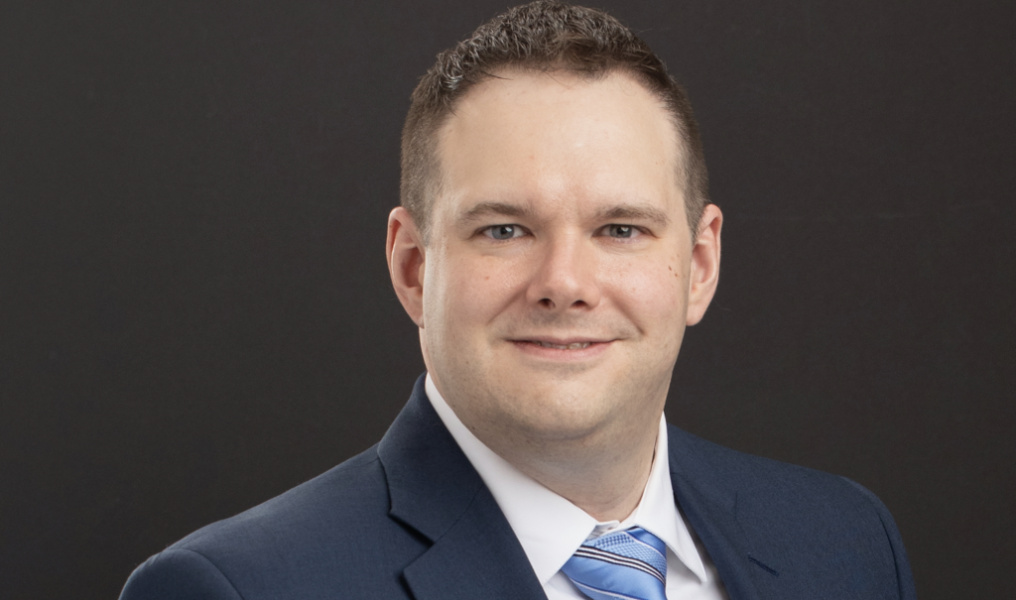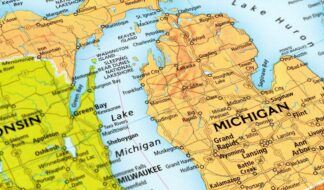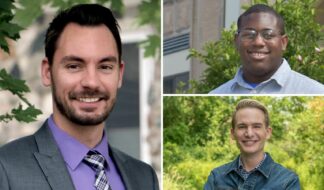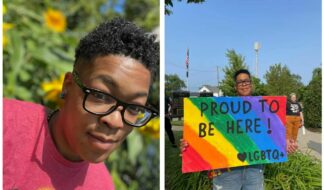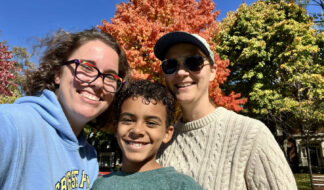As the Aug. 4 primaries get closer, voters will not only choose to vote Democrat or Republican but they'll cast their ballots for nonpartisan positions, too. Dennis Whittie is an openly LGBTQ candidate running for 43rd District Judge whose jurisdiction extends through Madison Heights, Ferndale and Hazel Park. In advance of the election, Whittie took the time to answer some of BTL's most pressing questions about his priorities should he take office in November.
Why do you think you're a good fit for the office?
I believe in "fair and smart justice." I am not the "status quo." The current system of justice is not working — for anyone. We need changes in our entire criminal justice and court systems. To do this, we must start at the most local levels, including our 43rd District Court. I am from all three communities that comprise the 43rd District. I was born in Madison Heights, lived in Hazel Park and began my education in the city, and now live in Ferndale being a graduate of Ferndale High School.
More importantly, I have a community service record to all three communities within the 43rd District.
Ferndale: I have lived in Ferndale since I was a child. Throughout the years, I have served the community as a volunteer board member on various boards and commissions, volunteered for Ferndale Pride, am a financial sponsor of Ferndale Pride, volunteered at community events, and, most recently, I have served a temporary term on the Ferndale City Council. Moreover, I am a member of the FernCare Board of Directors, an organization that provides health care to those without insurance.
Hazel Park: Prior to moving to Ferndale, I was a resident of Hazel Park. I began my education in the Hazel Park School District. Even though I am a resident of Ferndale, my house is located in the Hazel Park School District today. I support our local Hazel Park schools in the various fundraisers and band activities. My niece and nephew currently attend Hazel Park Schools.
Madison Heights: I served the residents of Madison Heights in two capacities. First, I was a volunteer police explorer for five years. I donated hundreds of hours at various community events and activities. I then returned as an instructor/advisor to the program for 10 years. Through this role, I donated over 2,000 hours while mentoring the youth in the program and preparing them for their future.
Importantly, when a candidate speaks about their community service, any voter should ask what they actually did when they were not getting paid to do it. I believe I have the most community service to all three cities.
What experience do you bring to the table that makes you stand out from the other candidates?
I am the most diverse candidate in this race. As a participant in the court process as a criminal defense attorney, a public defender that has handled over 5,000 cases, my jury and bench trial experience, a civil plaintiff and defense attorney, mediator and arbitrator, a retired whistleblower police officer, an Advanced EMT, volunteer probation officer, former youth specialist and a civil plaintiff myself, I am the most qualified candidate because I can view the issues that come before the court through multiple lenses. What is unique to me is that I have not just observed these roles but have experienced these various roles. It provides insight that no other candidate possesses relative to the matters before the court.
Integrity. A candidate should be judged by what they do and not merely by what they say. As a police officer, I reported violations of law by police officials from my employing city and paid for it with my career. Even during times of great personal risk and financial ruin, I did the right thing, as a judge should do.
Mediation & Arbitration. As a trained mediator and arbitrator, I am able to focus on the issues and not merely on the positions of the litigants. Through my mediation training, I am skilled in active listening to ask parties questions that allow them to see issues from a different point of view and come to a resolution.
Intellectual Curiosity. Advocating and adjudicating matters in an effective manner requires an attorney to possess intellectual curiosity. Through this, it is most important to get the right result — versus a rushed judgment for time management. I will put in the effort and time to get every decision I render to be legally correct.
What are your top 3 priorities as judge?
I have five top priorities actually.
My priorities for the court all are a part of fair and smart justice. We must reevaluate how we approach criminal and civil justice in our courts. Any change must start at the local level through our district courts. My plan includes the following:
Mental Health Specialty Court Docket: This is a specialty docket that permits nonviolent offenders with mental health obstacles to participate in a strictly structured probation program. The program attempts to address any core issues related to a criminal defendant's mental health to reduce recidivism, improve the person's life, provide a support network and structure to keep that person on their track of improvement, and to keep their criminal record clean.
Establish closer ties to our local school districts: The 43rd District Court can offer more to our local youth. We need to bring these connections between the local court and our schools on a more regular basis. I will work to establish closer ties between the 43rd District Court and our local school districts. Ideas that would be considered include a mentorship program, co-op opportunities and a closer look at our court system for those youth interested in law-related careers.
Establish Functional Sentencing: Functional sentencing involves looking at the core root of what is causing a person to violate the law. While everyone must accept personal responsibility for their actions, the court can still attempt to address the underlying issues that brought the defendant to the court in the first place. Functional sentencing works with partnerships with various community resources to assist defendants. I have been a defense attorney and observed those with a history of nonviolent offenses reoffending. After functional sentencing, many persons report that that experience was the best thing that could have happened to them and their lives are changed for the better.
Empower Litigants Through Civil Mediation: In civil cases, many litigants are able to settle their own matters prior to coming to court for a long and costly trial. However, in many cases, a third-party mediator is extremely helpful to give litigants the power to negotiate their own outcome and settlement. As a trained mediator, I will encourage mediation in all civil matters. In cases where no settlement is reached, I will be a fair judge to provide each litigant his or her day in court. No party should be forced into settlement.
End For-Profit Sentencing: I will institute sentences that are not based on revenue enhancement without any other purpose. We have too much for-profit corrections throughout our country. Simply adding on fees and more fines for the sake of raising revenue for the government is not acceptable. To get true criminal justice reform, this must be addressed.
In light of the recent Black Lives Matter protests, many communities are looking closely at criminal justice reform in large ways and small. As a judge, what can you do to promote fairness in your courtroom and more broadly, in the criminal justice system?
I currently am a criminal defense attorney and contracted public defender (36th District Court—Detroit). Of over the 5,000 cases that I have handled in the 36th District Court, about 99% of my clients are African American. Even prior to my practice of law, I have lived and demonstrated the spirit of Black Lives Matter for decades. As a police officer in two communities and an EMT in the City of Detroit, I consistently assisted all persons, including African Americans, with quality of life, lifesaving, and life-supporting measures.
In my most recent police department, I reported violations of law committed by my department, city leaders and a few other police officers. I reported an accusation of a violation of civil rights — excessive force — to my police chief. I also reported an alleged sexual assault committed by another officer on a resident. In addition, I reported another officer's racist Facebook post where he clearly stated that firework laws should not be enforced against white people because they could afford fireworks, whereas our residents — majority African American — bought things with EBT cards.
With the consent of the River Rouge mayor and his political appointees, the city terminated me. They provided no real trial board hearing and basically wanted to rid themselves of me. A federal judge even found that the trial board was void of any due process. As my litigation continued for wrongful termination, the "reasons" for my termination were changing, sometimes by the week. Regardless, even when there was great risk to me personally and financially, I did the right thing.
Eventually, I won a partial summary judgment in my civil case and thereafter the case was settled to my benefit. The troubling part to me is that none of the violations I reported were actually addressed. For all the reports I made, the end result was my termination and nothing more. Even so, I would not change what I did as it was the right thing to do.
After I reported the violations of law, my then-police chief changed my work schedule and cut my hours to make it even more difficult for me to complete law school. Even so, I persevered. All of these experiences have led me to the path to run for District Court Judge. A good District Court judge not only appears in court and presides in a fair manner but is an active part of the community that they serve. The District Court is the court that is closest to the people and District Court judges have a unique role to fill as a judge at this level.
To promote fairness in the court and overall criminal justice system, I will as I always have in my life and as a judge, serve all communities whether Black, white, Hispanic, Arab, LGTBQ and all others. I will treat all those who appear in court equitably regardless of their history or background. More importantly, I as a judge will institute programs that can assist those persons who are before the court.
As a person who identifies as LGBTQ, are there particular life experiences that make you feel suited to the position you're running for?
Being the "B" in LGBTQ, I believe that, in addition to my professional diversity, this also gives me a unique viewpoint of the communities the District Court serves. As a Ferndale City Council member that served a temporary term, I was on the first-ever majority LGBTQ city council in the state. During my time on the city council, I passed a resolution denouncing the rising white supremacy movement, and I personally authored and received a unanimous vote to pass an anti-blight ordinance to prohibit advertisement papers being thrown around the city.
My proudest moment was offering an amendment to council member Julia Music's proposed ordinance to ban the destructive "conversion therapy" being used on any youth. My amendment turned the violation [that was treated like] a civil infraction — like a traffic ticket — to a criminal misdemeanor with a 90-day jail penalty — the harshest penalty a city council can enact. We were the first government entity in the entire state of Michigan to classify this reprehensible conduct as a crime. Today, Ferndale has the only law criminalizing this behavior. Even when the state legislature drags its feet, I was happy to be a part of leading the effort to enact this as a state statute for the benefit of not only society but specifically for our LGBTQ community.
My experiences also involve living in Ferndale when equal rights for LGBTQ persons were frowned upon. I worked on the civil rights ordinance campaign — that eventually passed after being placed on the ballot three times. I understand the viewpoint that LGBTQ youth and other persons struggling with LGBTQ issues have. My professional experience and my personal experience make me the most unique candidate to serve in this position.
The voters have a real opportunity to finally put some family on the bench.
What would you like more people to understand about District Courts?
I would like them to understand the role the court plays within the community. My plan involves community outreach and not just holding court sessions. Implementing my plan for the court will provide a better understanding and appreciation for the court and benefit our communities with increased public safety through reduced recidivism.
Editor's Note: This interview has been edited for length and clarity.
